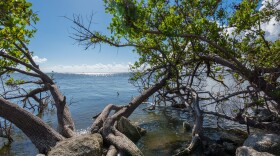Dozens of people concerned about the health of Florida springs gathered for a rally Thursday ahead of the Florida Department of Environmental Protection’s public workshop on a new draft rule to better protect those freshwater springs, which flow from the Floridan Aquifer, a primary source of drinking water for the state.
In Northeast Florida and in Central Florida, where Thursday’s rally was held, more than 90% of people get their water from the aquifer, according to the St. Johns River Water Management District.
But many of Florida’s springs are in trouble, polluted by high concentrations of nutrients like nitrogen and phosphorus. That’s why FDEP in 2018 adopted Basin Management Restoration Plans, or BMAPs, to guide efforts to restore water quality in the 24 springs deemed to be “impaired” by such nutrients.
But many springs aren’t on track to meet the water quality targets laid out in those BMAPs, according to data in FDEP’s statewide annual report. And that’s partly because of water quantity: if there isn’t enough water flowing through those springs, higher concentrations of pollutants can develop, according to Florida Springs Council Executive Director Ryan Smart.
“The common denominator is flow,” Smart said, explaining the inherent connection between water quality and water quantity. “Better flow equals less pollution.”

Two years before FDEP adopted those BMAPs, state lawmakers passed the Florida Springs and Aquifer Protection Act of 2016. The law directs FDEP to adopt “uniform rules” for issuing water use permits, also called consumptive use permits or CUPs, that don’t harm Florida’s 30 statutorily-designated Outstanding Florida Springs (OFS).
Additionally, the law directs FDEP to actually define the clause “harmful to the water resources” so the state’s water management districts have a common standard to refer to when determining whether or not a water use permit would be harmful.
But eight years later, the agency still hasn’t adopted new rules.
In 2016, the agency issued a notice of rulemaking development that it has since extended twice, citing the need for “additional time to further develop and solicit public comment on the rules associated with this rulemaking effort.”
Thursday’s meeting at the St. Johns River Water Management District’s office in Apopka marks the third time FDEP has introduced a draft rule that is insufficient to protect Florida springs according to the 2016 law’s mandate, Smart said.
“After eight years, [FDEP] has made zero progress in adopting a valid rule,” Smart said at Thursday’s rally. “Instead, for the third time, [FDEP] is once again proposing the same permitting rules that were already in place more than a year before the law was amended: the same rules that have already proven to cause significant harm to Outstanding Florida Springs.”
Smart described it as “a never-ending cycle.”
“The very idea that the same rules that cause significant harm could prevent any harm [to springs] would be laughable, if it wasn't so tragic,” Smart said.

Speaking at the rally, state Rep. Anna Eskamani, D-Orlando, said Florida’s freshwater springs are not only important for the environment, but for the state’s economy as well.
“Our springs are not only natural wonders, but they're also integral to the wellbeing of our environment and our communities. It impacts every part of our lives,” Eskamani said. “Yet again, we find ourselves in this situation time and time again, pushing [FDEP] to do what's right and to do what is legally required of them.”
Another, separate definition for important water resources exists in Florida statute, in addition to OFS. More than 350 Outstanding Florida Waters (OFW) are designated worthy of special protection due to their natural attributes, like excellent water quality or exceptional recreational value, per FDEP.
Some of Florida’s OFS are also designated as OFW — but not all. Ensuring that all 30 OFS are also categorically listed as OFWs could be one relatively simple way of boosting protection for springs, according to a report published by the Environmental and Land Use Law Section (ELULS) of The Florida Bar.
Such a change would also make “explicit the link between water quantity and water quality,” according to that 2019 report, which states “spring flow is directly related to the spring ecosystem’s health, and indicates how much water is stored in the aquifer.”

Jay Exum, a board member for the group Friends of the Wekiva River, reminded rally attendees of where exactly they all stood, outside the District’s Apopka office: within the Rock Springs and Wekiwa springshed, or groundwater contribution area.
The flow of water from Wekiwa and Rock Springs is already too low to sustain those springs’ ecosystems, Exum said, citing a recent St. Johns Water Management District study of minimum flows and levels. Exum said in developing the new rules, it’s critical for FDEP to not only consider impacts from future water use permits, but also permits that have already been issued.
“Develop rules that not only stop future permits from impacting these systems, but you've also got to look at those current permits that are already degrading the natural resources of the springs,” Exum said.
Many people continued voicing their concerns to FDEP directly at the agency’s workshop immediately following Thursday’s rally. Members of the public can submit comments on the draft rule for the next three weeks, according to FDEP.







